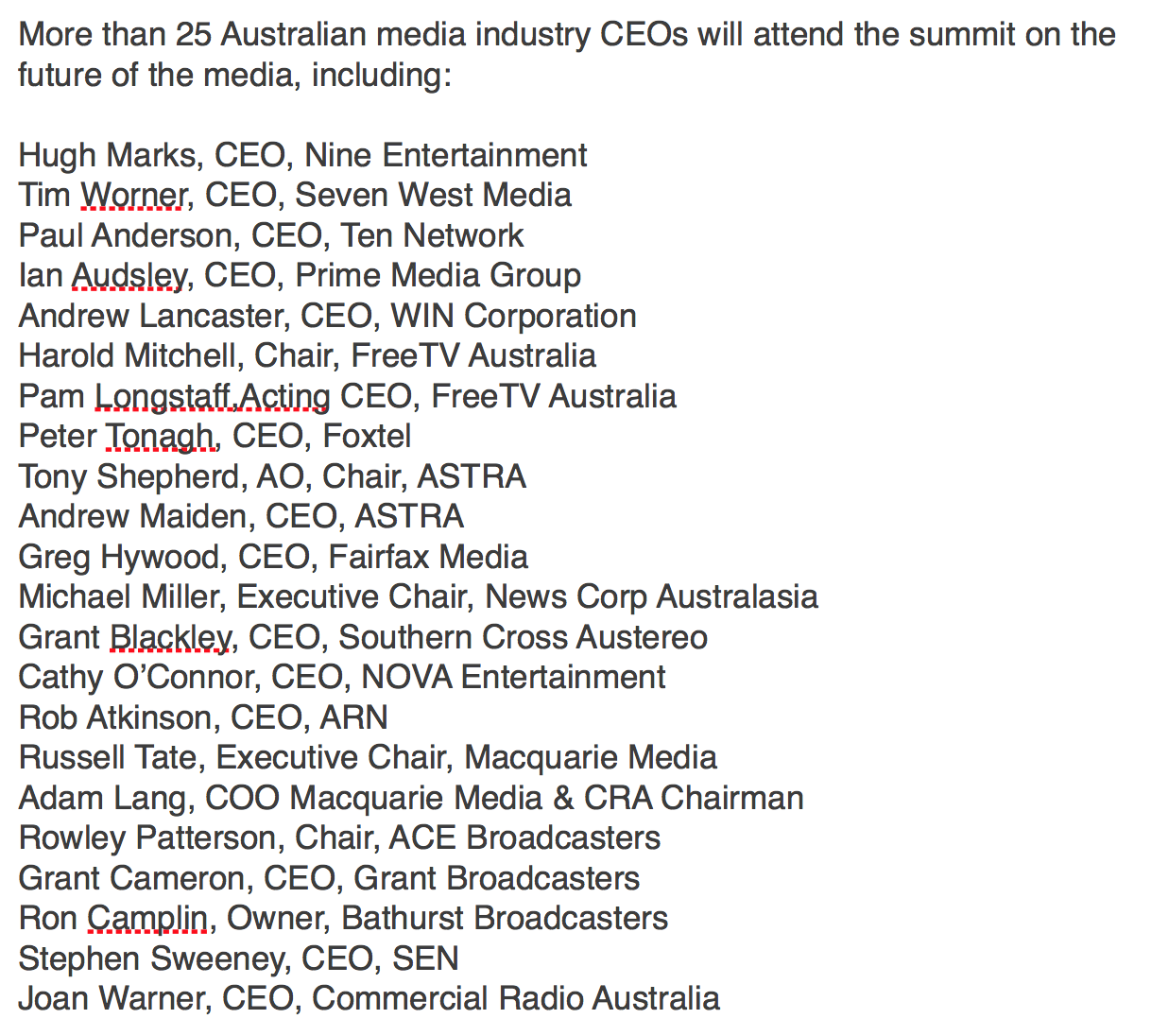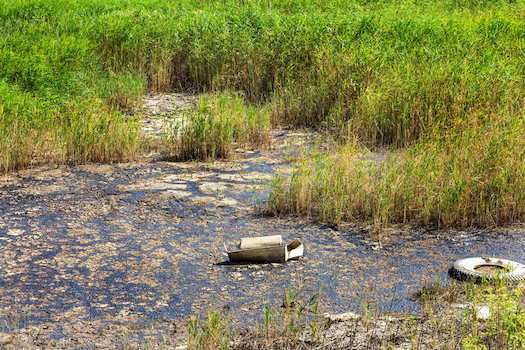Comment from Peter Saxon.
Today, Wednesday, is to be an “unprecedented” occasion. Never before have all the major operators of television, radio and press united with one voice – a voice of deep concern.
25 captains of Australian main stream media (msm) will converge on Canberra to address our lawmakers in a last ditch effort to ensure that the government’s proposed media reforms are passed into law by the Senate.
At stake is Australian media as we know it. Perhaps even Democracy itself according to Senator Nick Xenophon (below left).
 The concern is that Australian msm is being challenged by new global online entities. While radio, so far, remains largely unaffected, FTA television as well as Foxtel is struggling to compete with the likes of Netflix and YouTube. Newspapers, both printed and online, are at crisis point.
The concern is that Australian msm is being challenged by new global online entities. While radio, so far, remains largely unaffected, FTA television as well as Foxtel is struggling to compete with the likes of Netflix and YouTube. Newspapers, both printed and online, are at crisis point.
Disruption of all established industries is inevitable in the face of rapid technological change. So, what makes media special?
The government didn’t jump to the rescue of businesses like record stores that disappeared overnight, replaced by downloaded content. Or cameras, film and development made obsolete by smartphones and digital storage. Apart from (belatedly) leveling the playing field by making online shoppers pay GST on all imported goods, the government isn’t doing much to save established bricks and mortar retail business models either.
Why should media be any different?
Well, in cases like those mentioned, consumers gained huge, tangible benefits from the newcomers. How good is it to not to have to go out on a rainy night to rent a movie only to find that all the copies are out? Instead, with a few keystrokes, from the comfort of your armchair, you can now stream or download a movie within minutes and not risk a fine if you fail to return it to the video store.
But what if Australian msm was to disappear and go the way of, say, encyclopaedias or street directories, would the replacements be better than the media they disrupted?
 The real issue is not so much Netflix and Stan or iTunes and Spotify. Although, as SCA CEO Grant Blackley (left) points out, “They are effectively international companies that don’t tell local stories, they typically don’t employ vast numbers of Australian employees. And, for the most part, a lot of these companies don’t pay Australian tax.”
The real issue is not so much Netflix and Stan or iTunes and Spotify. Although, as SCA CEO Grant Blackley (left) points out, “They are effectively international companies that don’t tell local stories, they typically don’t employ vast numbers of Australian employees. And, for the most part, a lot of these companies don’t pay Australian tax.”
That’s true but apart from the fact that they’ve wiped out video and record stores along with thousands of jobs that went with them, the content they offer hasn’t changed, just the method of digital delivery which is more convenient than physical distribution.
The bigger issue, to my mind, is around news, information and comment. And in a broader sense Australian culture. Speaking at a recent media conference, Senator Xenophon said, “This goes to the heart of our democracy, if we want the fourth estate to be vibrant and diverse, we need to deal with these issues.”
If we’re talking Democracy – our way of life – what our forefathers fought for… the biggest issue surrounds aggregators and search engines such as Google and facebook that create no news of their own yet make massive profits distributing the work of others.
This has two main effects:
1.) It starves the original content creators of revenue – aggregators have cut a $3.2 billion slice out of the Australian advertising pie in recent years. It has already had a catastrophic effect on the ability of news outlets to employ experienced journalists and editors who check facts and corroborate evidence. Inevitably, news, analysis and comment from hitherto quality outlets is being dumbed down.
The aggregators don’t really care where the content comes from or how it’s sourced, they just want fodder to feed their audiences.
2.) The sophisticated algorithms that advertisers so love, because they identify individual user behaviour, are also used to push news that they know appeals to consumer tastes and interests. And while that may be good for music and movies it’s not so good for the free exchange of disparate ideas in a democracy because it acts to reinforce preconceived hates and prejudices as well. What’s more, it creates silos of like-minded facebook friends who, supported by mutual “likes” can easily come to believe that their beliefs are shared by the majority or at least a much larger group than they actually represent.
To exacerbate matters, anyone can create a webpage and spout whatever rubbish they want from a virtual ip address in Antigua where no one can touch them, sue for libel or invoke 18c. This “news and opinion,” however uninformed, can also be picked up by aggregators’ algorithms and fed, unfiltered, to social media silos. Whether the content is “true” or not will predominantly depend on how well it resonates with each silo’s own views. If they want to believe it’s true, then it is.
Which brings us to “fake news” the phrase made famous by the current leader of the “free world.” Whatever else Donald Trump stands for and may have done for the good of America, when he declared, ‘the election’s rigged, the msm dishonest and fake,’ he did more to undermine the pillars of Democracy than the Chinese, Russians and Islamic State combined could have hoped to achieve in years.
At least President Trump’s definition of what constitutes fake news is easy to understand. If it supports him, it’s true. If it is critical, it’s fake. More the worry is that the term “fake news” has become a fashionable insult that can be used by anyone to denigrate any “news” with which one does not agree.
So, if all news is deemed fake or true based on one’s belief rather than actual or even “alternative” facts, what then is truth? Or to paraphrase Mad Men, where does the truth lie?
It has become particularly fashionable to dismiss all msm as fake which follows the current trend to discount expert advice from, say, qualified Doctors in favour of quack cures. Highly credentialed CSIRO scientists are routinely ridiculed because their findings are at odds with strongly held political views.
As radioinfo’s Steve Ahern wrote in an article on the topic: The antidote to fake news is better professional media. But with aggregators sucking revenue from the real news engines, more professionalism is becoming harder to achieve.
The issues are complex but in my opinion come down to rapidly moving technologies that have effectively altered the way in which we interact socially much faster than authorities can devise the legal and ethical frameworks by which democratic societies operate.
For all of msm’s faults, it employs qualified journalists who are taught to check facts and are accountable to the local community. Australian msm organisations have a physical address where people can lodge complaints. They’re subject to various laws and codes that keep them accountable. They also employ an army of support staff such as producers, creative teams as well as talent who pay personal taxes on top what their company pays.
 In announcing the government’s media reform package, Communications Minister, Senator Mitch Fifield (left) said, “The reforms are vital to the long term viability of the sector, which provides access to high quality Australian content that contributes to, and reflects, Australian cultural life.”
In announcing the government’s media reform package, Communications Minister, Senator Mitch Fifield (left) said, “The reforms are vital to the long term viability of the sector, which provides access to high quality Australian content that contributes to, and reflects, Australian cultural life.”
Nonetheless, critics accuse him and the Turnbull government of dismantling key laws that were introduced by Paul Keating some 30 years ago to ensure media would remain diverse. The result, they say, will encourage existing operators to merge, resulting in fewer owners with greater national reach and a larger share of voice in each market.
Media Reform Package in a nutshell.
Beyond the abolition of licence fees for both radio and television, the two reforms with the greatest implications are:
Repeal of the ‘two out of three rule’ that limited media owners to a choice of operating any two of the three main media; Radio, Television or Print in any one market. Now they can operate all three.
Repeal of the ’75% rule.’ Til now television networks were only permitted a reach of 75% of the potential national audience. Now they’ll be able to reach up to 100%.
Crucially, laws that limit media ownership to one TV licence and two radio licences per market will remain. As will a minimum requirement of five independent voices in a metro market and four in a regional.
In Keating’s words in his media realm you could be a “Prince of Print or a Queen of the Screen.” He failed to add ‘Regent of Radio’ or ‘Radio Rex’ but the message was clear enough and it was okay for the times. But times have changed… a lot.
So, there’ll be more power in fewer hands – an outcome that rarely bodes well for consumer choice and jobs. But there are broader and much more pressing issues.
“I have a particular interest in changing our competition laws so that we have an ability for every media organisation to be able to take on those content aggregators and search engines that are cannibalising their content,” Senator Xenophon.
Grant Blackley is one of 25 msm CEOs who will meet with politicians in Canberra on Wednesday evening to put the industry’s case for reform to them. See the full list below. He says that this unprecedented show of unity is to demonstrate to parliament that as a group, who rarely agree completely on any issue, they can overcome their differences for the greater good.
“We’re imploring everyone, that you might not like every single aspect of this comprehensive package but that’s alright, not everyone on the media side agrees either. But we’re putting that aside because some action is better than no action.”
Or, in the words of Malcolm Turnbull, “Let not perfect be the enemy of better.”
Mr Blackley went on to say, “Fundamentally, we’re not playing by the same rules. Let’s take, for example our television assets which are bound by the 75% reach rule. Which means we can’t aggregate or work with our metropolitan counterparts whereas facebook and Google can do whatever they want on Australia wide geography.
“Also, we pay licence fees across both television and radio and no such fees exist for the disruptors.”
The media reform package is due to go before parliament during the current sitting. The vote is likely to be close. If Labor continues to oppose it then it will be up to the cross-bench independents to decide.
At present it looks as if the Government has the support Nick Xenophon’s party and David Leyonhjelm with Pauline Hanson firmly opposed. The others remain undecided.
Mr Blackley makes it clear, “If certain individuals or parties don’t support it then that is an action saying, ‘we are not prepared to support a change that will help the industry, help jobs and help localism.”
But politics is a game of quid pro quo. Even Senator Xenophon has added a proviso saying he would support reforms if it improves the ability of Australian media to compete with digital media companies “who don’t employ one journalist in this country,” and if it improves the quality of journalism, especially in regional media.
Mr Blackley is taking the challenge seriously and told radioinfo, “We’re certainly lifting the bar and we’re certainly investing.
“We have an enormous footprint in news gathering with regional radio. In regional television, under our new affiliation agreement, we’ve deployed 107 journalists into regional markets that otherwise would not be there.
“Fundamentally the collective benefit to local communities is more, not less.”
His final message to Canberra, “We all embrace change, we all embrace disruption. But we need to do it on a level playing field. And that’s not the case today, says Grant Blackley.

Peter Saxon


